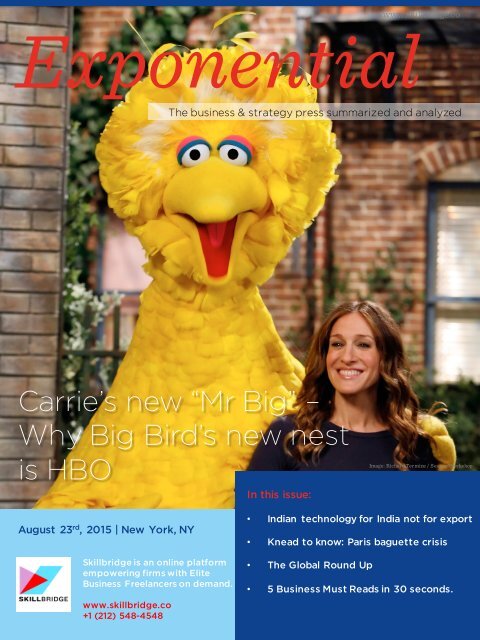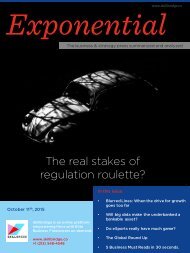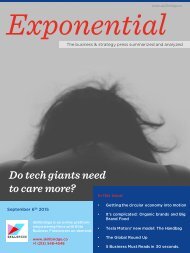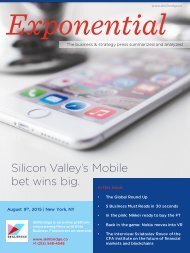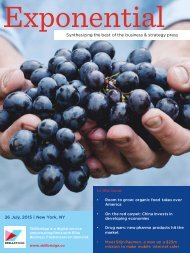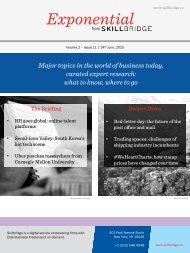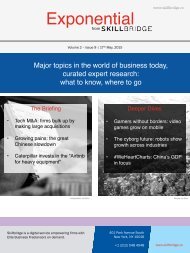Exponential: August 23rd, 2015
Carrie's new "Mr Big" - Why Big Bird now lives at HBO. Also in this issue: • Indian technology for India not for export • Knead to know: Paris baguette crisis • Big Data, Love and Ebola in Sierra Leone • The Global Round Up • 5 Business Must Reads in 30 seconds.
Carrie's new "Mr Big" - Why Big Bird now lives at HBO. Also in this issue: • Indian technology for India not for export • Knead to know: Paris baguette crisis • Big Data, Love and Ebola in Sierra Leone • The Global Round Up • 5 Business Must Reads in 30 seconds.
Create successful ePaper yourself
Turn your PDF publications into a flip-book with our unique Google optimized e-Paper software.
www.skillbridge.co<br />
<strong>Exponential</strong><br />
The business & strategy press summarized and analyzed<br />
Carrie’s new “Mr Big” –<br />
Why Big Bird’s new nest<br />
is HBO<br />
In this issue:<br />
Image: Richard Termine / Sesane Workshop<br />
<strong>August</strong> 23 rd , <strong>2015</strong> | New York, NY<br />
Skillbridge is an online platform<br />
empowering firms with Elite<br />
Business Freelancers on demand.<br />
www.skillbridge.co<br />
+1 (212) 548-4548<br />
• Indian technology for India not for export<br />
• Knead to know: Paris baguette crisis<br />
• The Global Round Up<br />
• 5 Business Must Reads in 30 seconds.<br />
1 +1 (212) 548 4548 www.skillbridge.co
<strong>Exponential</strong> the Skillbridge Magazine<br />
The global round-up<br />
US crude oil prices fall now below<br />
$40 a barrel<br />
For the first time since the<br />
financial crisis of 2007, US crude<br />
oil prices have fallen to below $40<br />
a barrel. The US shale industry<br />
continues to supply high levels of<br />
oil while data from Baker Hughes<br />
indicates an increase in the rigs<br />
currently drilling in the US. As the<br />
market works through a surplus of<br />
1 million barrels a day, analysts<br />
predict that prices will remain low<br />
in the short term.<br />
El Nino set to return<br />
waklingsf via<br />
flickr<br />
Mike Halpert, the deputy director of<br />
America’s National Oceanic and<br />
Atmospheric Administration, predicts<br />
that the current Nino could be “among<br />
the strongest since records began in<br />
1950.” Parched Californians might see<br />
this as a blessing but four years of<br />
drought and wildfires have left the<br />
landscape vulnerable. Heavy rainfall on<br />
exposed land may lead to mudslides and<br />
floods. The current record for El Nino<br />
was set in 1997-8. Storms are<br />
calculated to have caused $36 billion in<br />
damage to houses and infrastructure.<br />
2 +1 (212) 548 4548 www.skillbridge.co
<strong>Exponential</strong> the Skillbridge Magazine<br />
McDonalds to expand in Russia<br />
McDonalds has announced their<br />
intention to open 20 new restaurants in<br />
Russia. The FT reports that the move is<br />
significant as the American fast-food<br />
giant has been “caught in the middle of<br />
deteriorating relations between Moscow<br />
and Washington.” In 2014, McDonalds<br />
found itself the subject of a wide-ranging<br />
investigation over food safety standards.<br />
The probe caused the temporary closure<br />
of 200 of its 500 restaurants. Despite<br />
employing 40,000 people in Russia, its<br />
operations in the country provide less<br />
than 5% of the company’s overall<br />
operating profits.<br />
Japan Post expects $11 billion triple<br />
listing on November 4<br />
Reuters reports that the huge IPO of<br />
Japan Post Holdings - over a decade in<br />
the making - is expected to take place<br />
on November 4 <strong>2015</strong>. The Japanese<br />
government expects to sell at least $11<br />
billion of shares. Initially, it was<br />
thought that there would be an<br />
approximate 50-50 split between<br />
domestic and foreign investors. It now<br />
seems likely that up to 80% of stock<br />
will be reserved for domestic investors.<br />
3 +1 (212) 548 4548 www.skillbridge.co
<strong>Exponential</strong> the Skillbridge Magazine<br />
Why a changing market<br />
forced Elmo to move home<br />
• Over 40% of US households are using Subscription Video on Demand<br />
• Consumer spending on digital media will overtake traditional media in <strong>2015</strong><br />
Revenue in television is now streaming in<br />
Richard Termine / Sesane Workshop<br />
Blockbuster TV shows are following their audience and moving<br />
to streaming networks. Nielsen report that over 40% of<br />
American households are now watching TV online. Sesame<br />
Street’s move to HBO from PBS appears to be financially<br />
orientated with the production company said to be receiving a<br />
substantial increase on their current contract. However,<br />
changing consumer behaviours in how TV is consumed and,<br />
increasingly purchased, is forcing content producers to change<br />
they way they operate and who they work with.<br />
4 +1 (212) 548 4548 www.skillbridge.co
<strong>Exponential</strong> the Skillbridge Magazine<br />
Sesame was brought to you by the letters DVD not PBS<br />
“Yesterday’s DVD is today’s SVOD” according to Steve<br />
Youngwood, COO of Sesame Workshop. At present, only 10% of<br />
production costs are funded by PBS. The shortfall was largely<br />
made up from DVD sales and licensing. Both streams have been in<br />
freefall: since 2008 combined revenues from these sources<br />
dropped by 50%. Sesame Workshop made a $11m loss in 2014.<br />
Consumers are leaving DVD behind and consuming an increasing<br />
amount of content via paid-for Subscription Video On Demand<br />
(SVOD) providers such as Netflix and Amazon Prime. The launch<br />
of HBO Now indicates that HBO is shifting its premium content<br />
model from Cable to SVOD.<br />
Subscription streaming services are playing a game of thrones<br />
Penetration of Streaming<br />
Video On Demand<br />
(SVOD) in US TV<br />
Households<br />
• Any SVOD: 40.3%<br />
• Netflix: 36.0%<br />
• Amazon Prime: 13%<br />
• Hulu Plus: 6.5%<br />
Source: Nielsen<br />
With the numbers of SVOD users projected to rise, the major<br />
players are fighting battles for both market supremacy and<br />
customer retention. A key tactic is to invest heavily in what the<br />
FT describes as “Tent Pole” content – star programmes which a<br />
service is known for and which props up the larger offering.<br />
Market leader Netflix was the first major investor in the strategy<br />
spending $100m on House of Cards in 2011. In July, Amazon<br />
spent a rumoured $250m for Top Gear, the British car program.<br />
The figure is close to the BBC’s entire annual talent budget.<br />
Sesame Workshop will not comment on the exact value of its<br />
HBO deal, only commenting that it is an order of “multiples” over<br />
what PBS paid.<br />
What the brains think…<br />
In its 2014 Global Media Report, McKinsey points to two trends<br />
that may be fuelling the change from DVD to SVOD. Firstly, the<br />
authors project that consumer spending on digital media will<br />
overtake traditional media in <strong>2015</strong>, and be 26 percent larger by<br />
2018. Secondly, the article argues that “access to content is<br />
replacing ownership of content”. By 2018, it is estimated that the<br />
ratio of spending on access as opposed to ownership will be as<br />
high as 71:29. The cable industry is also feeling the pinch from<br />
SVOD. Their industry body estimates that about 40% of thirdand<br />
fourth-quarter TV-ratings declines can be attributed to<br />
subscription video services.<br />
Key Reading<br />
• HBR: What Sesame<br />
Street’s Move to HBO<br />
Says About the<br />
Media Business<br />
• FT: Amazon pays<br />
$250m to sign<br />
departing Top Gear<br />
trio for new show<br />
• Variety: Why<br />
‘Sesame Street’ Had<br />
to Turn a Corner<br />
• McKinsey: Global<br />
Media Report 2014<br />
5 +1 (212) 548 4548 www.skillbridge.co
<strong>Exponential</strong> the Skillbridge Magazine<br />
From outsourced to<br />
home grown<br />
• Venture capital inflows reach record highs of £4bn in India<br />
• Indian online market set to double to 580 million users in the next three years<br />
• Expanding market brings new and different challenges<br />
Indian technology for India not for export<br />
Last year saw $4 billion of venture capital funds invested in<br />
India with the lion’s share being devoted to tech companies.<br />
According to the WSJ, over 300 VC deals were completed, a<br />
figure double that of the year before. Indian entrepreneurial<br />
talent is increasingly staying in the subcontinent or<br />
returning home. Investors are on the hunt for a successor to<br />
China’s Alibaba; global giants are doubling down their bets<br />
on India’s digital economy in response.<br />
6 +1 (212) 548 4548 www.skillbridge.co
<strong>Exponential</strong> the Skillbridge Magazine<br />
High stakes games<br />
India - historically known as a technology outsourcing and<br />
exporting hub - is rapidly transitioning into a thriving domestic<br />
battleground. BCG estimates that the online market in India<br />
will double in size to 580 million users in the next three years;<br />
the value of online-enabled business is projected to increase by<br />
65% to $200 billion in the same time frame. In the hunt for the<br />
next Alibaba, investors and corporations have been aggressive<br />
in their pursuits- leading e-commerce marketplace Flipkart<br />
raised a $1 billion funding round in 2014 only for Amazon to<br />
instantly pledge to invest $2 billion in its Indian operations.<br />
India has unique challenges<br />
Investment alone is unlikely to be sufficient to win Indian<br />
markets. Both Flipkart and Amazon must grapple with the<br />
challenges of a rapidly changing Indian internet consumer and<br />
market landscape combined with complex local challenges. The<br />
WSJ points to sceptics citing India’s poor internet and logistics<br />
infrastructure, its cash-based economy and the wide spectrum<br />
of languages used as challenges for digital companies. Flipkart<br />
have responded to these challenges robustly. By September<br />
<strong>2015</strong>, the platform will only be accessible via mobile. In<br />
addition, the firm has built a substantive non-urban delivery<br />
network, with on cash-on-delivery payment systems.<br />
What the brains think…<br />
In its India@Digital.Bharat Report, BCG is bullish about the<br />
prospects of India’s digital economy, estimating that the<br />
domestic internet economy may be worth as much as $200<br />
billion. In keeping with the trend for building ‘Indian<br />
technology for India’, it argues that India’s landscape will be<br />
“older, more rural, more gender balanced, more mobile, and<br />
more vernacular” than today’s users who are largely under 25,<br />
urban, and English-friendly.<br />
India faces notable challenges in delivering internet to<br />
increasing numbers. In the HBR, Chakravorti and Chaturvedi<br />
claim that the Indian government’s current connectivity plans<br />
may well be sub-optimal for the scope of the nation’s ambition.<br />
Key Reading:<br />
• HBR: Digital<br />
Fairness vs.<br />
Facebook’s Dream of<br />
World Domination<br />
• WSJ: Venture Money<br />
Floods Into Indian<br />
Startups<br />
• BCG: INDIA @<br />
DIGITAL . BHARAT<br />
7 +1 (212) 548 4548 www.skillbridge.co
<strong>Exponential</strong> the Skillbridge Magazine<br />
Apple Watch – cool<br />
or corporate?<br />
• Large Enterprise CRM and Intelligence invest heavily in wearables<br />
• Apple watch to hit 16.7m shipments by end of <strong>2015</strong><br />
PauliCarmody / Foter / CC BY<br />
Is the Apple Watch more work than play?<br />
While Apple remains tight lipped about exactly how many<br />
timepieces it has sold, the Apple Watch’s market share is<br />
estimated to hit 68% this year with Forbes reporting that the<br />
firm will make approximately 16.7m shipments by the end of<br />
<strong>2015</strong>. The device, launched in April and positioned as a<br />
premium consumer item, has seen a swathe of consumer apps<br />
developed for it. It remains unclear, however, exactly how<br />
successful these apps have been. Enterprise vendors who have<br />
traditionally been late entrants into Apple’s ecosystem seem<br />
notably more bullish about the potential of the device.<br />
8 +1 (212) 548 4548 www.skillbridge.co
<strong>Exponential</strong> the Skillbridge Magazine<br />
What’s keeping Apple Watch users happy?<br />
Despite criticism about the limitations of the Apple Watch,<br />
Apple CFO Luca Maestri cites a study by research firm Wristly<br />
which claims that 97% of customers are satisfied with the<br />
device. The same research firm later published a study pointing<br />
to Apple Pay, Apple’s payment service on the watch, as a notable<br />
driver of satisfaction - over apps and other features. Few<br />
consumer app developers have been vocal about the positive<br />
impact of the device on their business. An exception is Henrik<br />
Torstensson, CEO of Swedish health start-up Lifesum, who tells<br />
Bloomberg that their Apple Watch app is driving growth in the<br />
US market. Lifesum has increased its user base from 11m to<br />
20m in 9 months.<br />
Enterprise firms are starting to “think Different”.<br />
More prominent Apple Watch advocates are Enterprise data<br />
and intelligence juggernauts, who are putting significant weight<br />
behind their efforts for the device. In June, SAP, the German<br />
software giant, announced 12 watch apps to increase the<br />
availability of operational company data. Not to be outdone,<br />
rival Salesforce has created a whole division for developing<br />
wearable technology. This month Salesforce went live with 20<br />
apps for the Apple Watch, ranging from project tracking to<br />
providing logistics information for workers in the field.<br />
Salesforce views the watch as an opportunity to provide greater<br />
responsiveness to customers. Apple Watches “can give you the<br />
right intelligence and predictive information you need at the<br />
time you need it” said Lindsey Irvine, head of the Salesforce<br />
Wear initiative.<br />
What the brains think…<br />
In its “Wearable Future” report, PWC underlines the healthy<br />
growth trajectory of wearables, and points to the possible<br />
parallels with tablet adoption. PWC cite Enterprise firms as<br />
having a notable role in the adoption of wearables, not primarily<br />
for functionality but for cost: 72% of consumers are willing to<br />
use wearable devices such as the Apple Watch but only if their<br />
employer pays for it. PWC’s research data indicates that the<br />
simplicity of software and productivity features must be clearly<br />
visible. Such goals are not easily attainable given the nascence<br />
of the device and the limited screen real estate.<br />
Key Reading:<br />
• Forbes: Apple Watch<br />
To Dominate<br />
Smartwatch Market<br />
For Years<br />
• FT: Apple Watch<br />
beats internal<br />
forecasts – CFO<br />
• Bloomberg: Apple<br />
Watch Boosts<br />
Downloads at<br />
Swedish Fitness App<br />
Lifesum<br />
• PWC: The Wearable<br />
Future<br />
9 +1 (212) 548 4548 www.skillbridge.co
<strong>Exponential</strong> the Skillbridge Magazine<br />
Knead to know: Paris<br />
baguette crisis<br />
Parisians struggle at the boulangerie<br />
The streets of Paris are echoing to the sound of “zut<br />
alors” as labour reforms have made it harder to find an<br />
open bakery, creating a shortage of baked goods. For the<br />
first time in fifty years, bread-makers are no longer<br />
having their summer holidays regulated by Parisian<br />
authorities and can take off as much time as they like in<br />
July and <strong>August</strong>. While bakers seemed pleased, the same<br />
cannot be said for their clients. According to the FT, the<br />
reforms are part of a set of programmes “designed to<br />
liberalise a range of markets including intercity coach<br />
services and legal professions”.<br />
10 +1 (212) 548 4548 www.skillbridge.co
<strong>Exponential</strong> the Skillbridge Magazine<br />
Winners and Losers<br />
Good Week For: SkinVision<br />
SkinVision, a start-up that deploys smartphone<br />
technology and visual algorithms to let users track<br />
changes in their moles, has announced that it has<br />
received an additional $3.5 million in funding. In total, the<br />
firm is thought to have received between $5.7-6.8 dollars.<br />
Bad Week For: Toyota<br />
Two huge explosions near Tianjin in northern China have<br />
disrupted the supply chains of major companies including<br />
Toyota and John Deere. The blasts at a warehouse for toxic<br />
chemicals is thought to have killed more than 100 people.<br />
Bad Week For: Walmart<br />
Good Week For: Coursera<br />
Coursera has disclosed that it has taken more than 1<br />
million registrations for online courses in China. Given<br />
that the internet firewall and cultural differences act as<br />
high barriers to entry, the US ed-tech company’s<br />
performance is impressive. China has now become the<br />
firm’s second largest market, overtaking India.<br />
Walmart has cut its full-year earnings guidance as America’s<br />
second largest retailer revealed that staffing costs had risen<br />
more than expected. The company’s share price is down<br />
almost 19% in <strong>2015</strong>.<br />
11 +1 (212) 548 4548 www.skillbridge.co
The Briefing<br />
<strong>Exponential</strong> the Skillbridge Magazine<br />
Five key reads<br />
aiigle_dore via flickr<br />
Wired: Easy DNA editing will remake the world<br />
GENETICS; BIOTECHNOLOGY–Two venerable universities are currently<br />
engaged in a battle to patent a technique for editing genes. The battle<br />
between MIT & Harvard versus the University of California over CRISP-<br />
Cas9 might be appear obscure. In fact, as Wired reports, the winner of the<br />
legal dispute will have prime rights to a generation-defining scientific<br />
advance. CRISPR-Cas9 allows scientists to delete, add or modify genes with<br />
unprecedented speed and ease. The technique has been likened to a wordprocessor’s<br />
“find and replace” function, and can be used to introduce or<br />
remove a number of genes at the same time. The breakthrough’s most<br />
powerful – and morally alarming - implications could be to give scientists<br />
the ability to “edit” a human embryo. While deep ethical questions remain,<br />
four CRISPR start-ups have already raised $158 million in venture funding.<br />
The Economist: “Death of a Car Salesman”<br />
AUTOMOBILES; FRANCHISING– Ten years ago Americans visited an<br />
average of five car dealers before they made a final purchase; today,<br />
according to McKinsey data, the figure is down to just 1.6 trips per sale. The<br />
Economist’s piece highlights the declining role of the car salesman.<br />
Customers increasingly arrive at forecourts with clear knowledge of the<br />
model and specification they want and the exact price they are willing to<br />
pay. With cars being built and tested to higher standards even the fabled<br />
“test drive” is on the wane. Customers are now demanding something<br />
different of the car salesman: rather than a smooth-talking seller they want<br />
someone to talk them through the digital features – navigation systems,<br />
entertainment services and automated parking – which cars can offer.<br />
Following Apple’s lead, a range of manufacturers including BMW, Daimler<br />
Benz and Kia have introduced “product geniuses” to their showrooms,<br />
further eroding the salesman’s once unassailable authority.<br />
12 +1 (212) 548 4548 www.skillbridge.co
<strong>Exponential</strong> the Skillbridge Magazine<br />
The Briefing<br />
Bloomberg: Egg-Price Surge Forces Restaurants to Hype<br />
Burgers and Smoothies<br />
COMMODITY PRICES; ADVERTISING -As egg prices<br />
continue to rise amid the American bird-flu epidemic,<br />
companies are being forced to adopt unusual marketing<br />
strategies. In order to restrain demand for egg-based<br />
products, Dunkin’ Donuts are advertising smoothies and iced<br />
coffees while Denny’s are pushing burgers rather than<br />
omelets. At Denny’s, eggs make up approximately 10% of<br />
overall commodity costs.<br />
HBR: Why people thrive in co-working spaces<br />
CO-WORKING; DIVERSITY -Research suggests that people<br />
in co-working environments are more likely to experience<br />
higher levels of “vitality and learning”. On a 7-point scale, coworkers<br />
come close to reporting an average score of 6. The<br />
authors of the study suggest that people who use co-working<br />
spaces see their work as more meaningful than their<br />
corporation-bound counterparts. Co-workers have to deal<br />
with less direct competition and the distractions of office<br />
politics. At the same time, they enjoy increased opportunities<br />
to form a distinctive identity within a diverse community.<br />
HBR: Digital Fairness vs. Facebook’s Dream of World<br />
Domination<br />
INTERNET ACCESS; NET NEUTRALITY - As Mark<br />
Zuckerberg continues on his mission to bring the benefits of<br />
the internet to the 4.5 billion people who currently lack<br />
access, Bhaskar Chakravorti and Ravi Shankar Chaturvedi,<br />
pose a set of ethical questions about the possible<br />
consequences. Internet.org – the Facebook-led initiative –<br />
offers free access to a selected number of websites including a<br />
“lite-version” of Facebook. The Tufts academics ask whether<br />
society should always strive to become more digitally<br />
inclusive even if this means that net neutrality is<br />
compromised.<br />
13 +1 (212) 548 4548 www.skillbridge.co
<strong>Exponential</strong> the Skillbridge Magazine<br />
We heart h charts<br />
Trane de Vore via flickr<br />
The world’s most “liveable” cities<br />
Fifty-seven of the world’s largest<br />
cities are becoming more difficult to<br />
live in according to The Economist<br />
Intelligence Unit. The most amenable<br />
places are “mid-sized cities in<br />
wealthier countries with relatively<br />
low population density.”<br />
Top influencers in social media have unexpected power<br />
Source: The Economist<br />
Manufacturing isn’t dead<br />
The unstoppable rise of digital data<br />
Source: Thomson Reuters in the Economist<br />
Data never sleeps. Every interaction<br />
with digital technology creates trails<br />
of information which can be<br />
measured and analysed. In an average<br />
hour, Tinder users reject the advances<br />
of 35 million suitors and Vine users<br />
play a staggering 62 million videos.<br />
Source: Domo<br />
Where is the talent?<br />
For the second year in a row, the United<br />
Arab Emirates has topped the LinkedIn<br />
global migration study. The UAE has<br />
focused on diversifying job opportunities<br />
and the majority of new professional<br />
migrants are working in tech, financial<br />
services and engineering.<br />
Source: LinkedIn<br />
14 +1 (212) 548 4548 www.skillbridge.co


